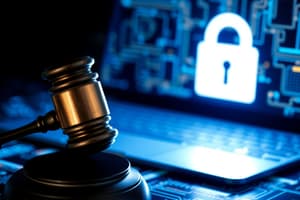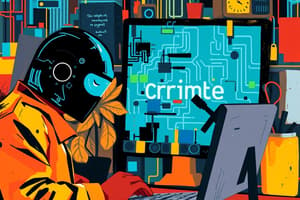Podcast
Questions and Answers
What is a major issue in jurisdiction for computer crimes?
What is a major issue in jurisdiction for computer crimes?
- Computer crimes can only be prosecuted locally.
- Jurisdiction depends on the location of the criminal and the victim. (correct)
- It is always clear where the crime occurred.
- All computer crimes fall under federal jurisdiction.
All computer crimes are defined as requiring high technical expertise.
All computer crimes are defined as requiring high technical expertise.
False (B)
Name an early form of computer crime mentioned in the content.
Name an early form of computer crime mentioned in the content.
Theft of physical technology or sabotage of automated machines.
The __________ of programs like Morris Worm demonstrated the vulnerability of computer systems.
The __________ of programs like Morris Worm demonstrated the vulnerability of computer systems.
Match the following computer crimes with their descriptions:
Match the following computer crimes with their descriptions:
Which factor does NOT complicate the investigation of computer crimes?
Which factor does NOT complicate the investigation of computer crimes?
Lack of international cooperation can hinder the prosecution of computer crimes.
Lack of international cooperation can hinder the prosecution of computer crimes.
What did the AT&T crash reveal about telephone systems?
What did the AT&T crash reveal about telephone systems?
The act of __________ is used to encode information, making it difficult for others to access.
The act of __________ is used to encode information, making it difficult for others to access.
Which of the following is a potential consequence of the perception of anonymity in computer crimes?
Which of the following is a potential consequence of the perception of anonymity in computer crimes?
Which of the following early hackers was known for breaking and entering into U.S. Missile Command?
Which of the following early hackers was known for breaking and entering into U.S. Missile Command?
The term 'hacking' originally referred only to criminal activities.
The term 'hacking' originally referred only to criminal activities.
What is phreaking?
What is phreaking?
In the context of computer security, _____ refers to inexperienced hackers using others' programs to exploit vulnerabilities.
In the context of computer security, _____ refers to inexperienced hackers using others' programs to exploit vulnerabilities.
Match the hacking motivations with their descriptions:
Match the hacking motivations with their descriptions:
What is a 'call-sell' operation?
What is a 'call-sell' operation?
The black market and gray market are the same in their operations regarding software.
The black market and gray market are the same in their operations regarding software.
Who were the original hackers primarily motivated by?
Who were the original hackers primarily motivated by?
Cyber-criminal organizations pose a _____ threat compared to individual hackers.
Cyber-criminal organizations pose a _____ threat compared to individual hackers.
Which of the following is NOT a motivation for contemporary hacking activities?
Which of the following is NOT a motivation for contemporary hacking activities?
What factor may complicate jurisdiction in computer crimes?
What factor may complicate jurisdiction in computer crimes?
Lack of international cooperation can enhance the prosecution of computer crimes.
Lack of international cooperation can enhance the prosecution of computer crimes.
Name one early form of computer crime.
Name one early form of computer crime.
The method of __________ makes it harder for authorities to prosecute computer crimes.
The method of __________ makes it harder for authorities to prosecute computer crimes.
Match the following early forms of computer crime with their descriptions:
Match the following early forms of computer crime with their descriptions:
Which of the following can be a fruit of illegal computer activity?
Which of the following can be a fruit of illegal computer activity?
The perception of anonymity can deter individuals from committing computer crimes.
The perception of anonymity can deter individuals from committing computer crimes.
What was the significant consequence of the Morris Worm?
What was the significant consequence of the Morris Worm?
MILNET was accessed by a hacker via the independent data carrier __________.
MILNET was accessed by a hacker via the independent data carrier __________.
Which of the following represents a challenge in defining computer crimes?
Which of the following represents a challenge in defining computer crimes?
Which early hacker was known for being perhaps the most famous?
Which early hacker was known for being perhaps the most famous?
Phreaking involves the legal manipulation of telecommunications carriers.
Phreaking involves the legal manipulation of telecommunications carriers.
What term is used for inexperienced hackers who use scripts written by others?
What term is used for inexperienced hackers who use scripts written by others?
The motivations for contemporary hacking include ____, economic goals, and personal notoriety.
The motivations for contemporary hacking include ____, economic goals, and personal notoriety.
Match the following terms with their definitions:
Match the following terms with their definitions:
What is one consequence of social engineering in technology?
What is one consequence of social engineering in technology?
The original hackers were primarily motivated by criminal intentions.
The original hackers were primarily motivated by criminal intentions.
The selling of stolen access codes, referred to as __________ operations, is a modern hacking strategy.
The selling of stolen access codes, referred to as __________ operations, is a modern hacking strategy.
What is a consequence of the absence of authentication information on pirated software?
What is a consequence of the absence of authentication information on pirated software?
Which motivation for hacking is considered a form of voyeurism?
Which motivation for hacking is considered a form of voyeurism?
Flashcards are hidden until you start studying
Study Notes
Computer Crime Overview
- Computer criminals display varying levels of technical sophistication, impacting the seriousness of offenses.
- Investigation complexity often correlates with the technical expertise of law enforcement agencies.
Challenges in Computer Crime Investigation
- Jurisdiction issues arise as crimes can occur across multiple locations, complicating legal frameworks.
- International cooperation is often hindered by lack of agreements, leading to difficulties in prosecution.
- Techniques like encryption and steganography can conceal criminal activity, delaying detection.
- Perception of anonymity may embolden offenders, as they can hide their identities.
Factors Influencing the Nature of Computer Crimes
- Targets can vary widely, including individuals, organizations, or nations, each with different consequences.
- The degree of technology involved differs; hacking typically requires advanced skills, whereas scams may use simple emails.
- Some crimes may only tangentially involve computer technology, such as online gambling compared to fraudulent claims.
Historical Context of Computer Crime
- Early computer crimes included physical theft and sabotage of technology.
- The KGB hacker's breach of MILNET in 1986 symbolizes early state-sponsored cyber incursions.
- The 1988 Morris Worm demonstrated the potential for widespread damage via self-replicating malware.
Notable Incidents
- AT&T experienced a significant crash due to software failure, highlighting system vulnerabilities.
- Overreaction by federal law enforcement towards Steve Jackson’s Games showcased investigative missteps.
Early Hackers
- Prominent early hackers include Kevin Mitnick and cOmrade, illustrating the diversity of hacker backgrounds.
- Early hacking culture was characterized by exploration and finding shortcuts rather than malicious intent.
Phreaking
- Involves manipulation of telecommunications systems, mostly through social engineering and tech devices like blue boxes.
- New strategies emerged to exploit access codes and PBXs, reflecting the evolving landscape of telecommunications hacking.
Evolution of Hacking Culture
- The 1960s saw benign hacking practices at MIT focused on problem-solving and clever pranks.
- The modern definition encompasses both ethical hacking and criminal activities, reflecting a shift in hacker motivations.
Motivations for Hacking
- Contemporary hackers may be driven by profit, revenge, notoriety, boredom, intellectual challenges, or political goals.
- Social engineering tactics exploit human behavior, making insiders a critical risk factor for organizations.
Cybercriminal Categories
- Script kiddies use existing scripts to exploit weaknesses, lacking understanding of coding.
- Cyberpunks refer to individuals causing chaos online, as labeled by law enforcement.
- Cyber-criminal organizations pose greater threats due to their structure and resources.
Market Distinctions
- The black market involves overtly illegal activities, while the gray market consists of borderline ethical business practices.
- Intellectual property issues include data piracy and potential counterfeiting, emphasizing the need for strict copyrights.
Internet and Technology Piracy
- Internet piracy can encompass both broadcast theft and distribution of illegal copies.
- Technology piracy includes counterfeiting methods for computer components, demonstrating the range of digital infringements.
Computer Crime Overview
- Computer criminals display varying levels of technical sophistication, impacting the seriousness of offenses.
- Investigation complexity often correlates with the technical expertise of law enforcement agencies.
Challenges in Computer Crime Investigation
- Jurisdiction issues arise as crimes can occur across multiple locations, complicating legal frameworks.
- International cooperation is often hindered by lack of agreements, leading to difficulties in prosecution.
- Techniques like encryption and steganography can conceal criminal activity, delaying detection.
- Perception of anonymity may embolden offenders, as they can hide their identities.
Factors Influencing the Nature of Computer Crimes
- Targets can vary widely, including individuals, organizations, or nations, each with different consequences.
- The degree of technology involved differs; hacking typically requires advanced skills, whereas scams may use simple emails.
- Some crimes may only tangentially involve computer technology, such as online gambling compared to fraudulent claims.
Historical Context of Computer Crime
- Early computer crimes included physical theft and sabotage of technology.
- The KGB hacker's breach of MILNET in 1986 symbolizes early state-sponsored cyber incursions.
- The 1988 Morris Worm demonstrated the potential for widespread damage via self-replicating malware.
Notable Incidents
- AT&T experienced a significant crash due to software failure, highlighting system vulnerabilities.
- Overreaction by federal law enforcement towards Steve Jackson’s Games showcased investigative missteps.
Early Hackers
- Prominent early hackers include Kevin Mitnick and cOmrade, illustrating the diversity of hacker backgrounds.
- Early hacking culture was characterized by exploration and finding shortcuts rather than malicious intent.
Phreaking
- Involves manipulation of telecommunications systems, mostly through social engineering and tech devices like blue boxes.
- New strategies emerged to exploit access codes and PBXs, reflecting the evolving landscape of telecommunications hacking.
Evolution of Hacking Culture
- The 1960s saw benign hacking practices at MIT focused on problem-solving and clever pranks.
- The modern definition encompasses both ethical hacking and criminal activities, reflecting a shift in hacker motivations.
Motivations for Hacking
- Contemporary hackers may be driven by profit, revenge, notoriety, boredom, intellectual challenges, or political goals.
- Social engineering tactics exploit human behavior, making insiders a critical risk factor for organizations.
Cybercriminal Categories
- Script kiddies use existing scripts to exploit weaknesses, lacking understanding of coding.
- Cyberpunks refer to individuals causing chaos online, as labeled by law enforcement.
- Cyber-criminal organizations pose greater threats due to their structure and resources.
Market Distinctions
- The black market involves overtly illegal activities, while the gray market consists of borderline ethical business practices.
- Intellectual property issues include data piracy and potential counterfeiting, emphasizing the need for strict copyrights.
Internet and Technology Piracy
- Internet piracy can encompass both broadcast theft and distribution of illegal copies.
- Technology piracy includes counterfeiting methods for computer components, demonstrating the range of digital infringements.
Studying That Suits You
Use AI to generate personalized quizzes and flashcards to suit your learning preferences.




